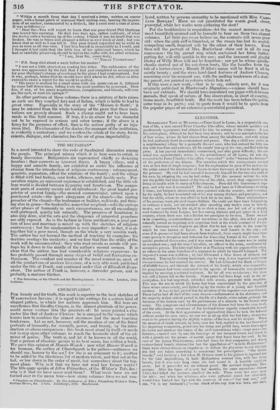CHURCHYARDS*.
FOR beauty and for truth, this work is superior to the best sketches of WASHINGTON IRVING : it is equal to his writings for a certain kind of elegant pathos, in which few authors approach him. But here are excellences that Geoffry Crayon, in the utmost plenitude of his power, could never venture into the precincts of: he never painted a cha- meter like that of Andrew Cleaves : he is unequal to the vigour which knows how to combine the utmost sternness and the most touching tenderness. Let us not, however, soil the mention of one of the finest portraits of humanity, for strength, power, and beauty, by the intro- duction of odious comparison : this book must stand hyitself—it needs not to step upon other volumes to reach the favourite shelf of the ad- mirer of genius. The truth is, and let it be known to all the world, that a person of absolute genius in its best sense, has written a book. We gave this opinion of Mansie Wauch : now what Mansie Wauch is for humour, the author of Churchyards is for pathos—authoress we should say, honour to the sex ! for she is an ornament to it ; another to be added to the illustrious list of modern talent, and that not at the tail, or low down in the order of merit, but somewhere about the top- most place. Why is it that we have not read her former works ? The title-page speaks of Ellen Fitzarthur, of the Widow's Tale, &c.: why is it that we have never read them ? What trash have we not turned over in the mean time—how many volumes have we not ana-
* Chapters on Churchyards. By the Authoress of Ellen Fitzarthur, widow's Tales, Solitary Hours, &c. 2 vols. Edinburgh, 1829. Blackwood.
lysed, written by persons unworthy to be mentioned with Miss CARO- LINE BowLES ! Have we not prostituted the words good, clever, powerful, while her works were gathering the dust !
Put the bookbinders in requisition—let the neatest morocco or the most beautifully-grained calf be brought to bear on these two elegant volumes. Let their possessor believe us, the contents will never grow old : when the pink calf is blanched, or the russia has lost its nostril- compelling smell, fr-agrant will be the odour of their leaves. Even then will the portrait of Mrs. Buckwheat shine out in all its rosy coarseness : the big garnet ring which enchained her fubsy butter- patting fist, will still sparkle in the sun ; and the innocent and playful idiotcy of Willy Moss will not be forgotten ; nor yet he whose spindle-
shanks started out of his cut-down hoots, like the handles from the tub of a butter-churn ; Blanch D'Albo's image will be fixed in all its
saintly beauty ; and the stern hard-lined features of Andrew Cleaves, mourning over his recreant son, with the melting tenderness of a doat- ing parent, are painted in colours which fade not.
If this were a new work,—that is to say, entirely new, for it was originally published in Blackwood's Magazine,--copious should have been our extracts. We should have inundated our paper with delicious morsels, that speak of nature, of fine observation, in short of country, home-made, hearthfeit truth. But the work has been before the public: some time in its parts ; and to quote from it would be to quote from the popular pages of an extensively-circulated periodical.


















 Previous page
Previous page